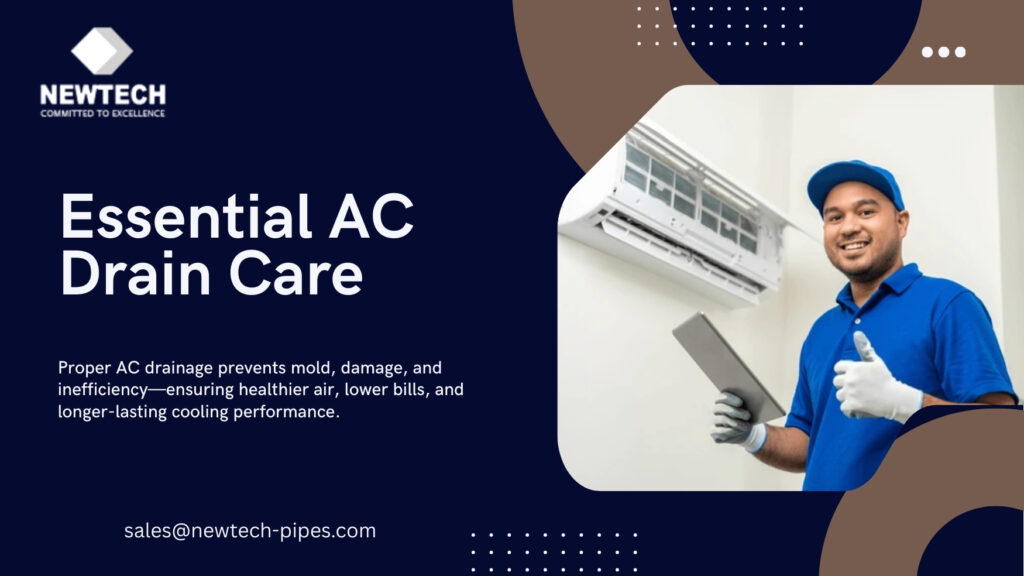A properly functioning AC drainage system removes moisture to prevent mold, water damage, and system failure. It includes critical parts like a drain pan, line, trap, and float switch. Poor installation or maintenance can lead to health risks, high repair costs, and reduced efficiency. Regular inspections ensure performance and safety.
What does your AC drainage system actually do?
Your air conditioner does more than cool the air in your space—it pulls water out as well. The humidity must then drain somewhere, which is when a drainage system helps. The drain system will drain the condensation and away from your dwelling home, most usually through the drainage pan and also a drain hose.
What happens when a home’s drainage isn’t provided properly?
Let’s be real—most folks don’t care about what they can’t see. Because your AC drainage system is often out of sight behind walls, ceilings, or in basements, it gets forgotten during routine maintenance inspections. But when something goes wrong, it can be costly and hazardous.
What are the effects of a malfunctioning drainage system?
- Mold development caused by water pooling
- Water damage to ceilings or walls
- Strong musty smells
- Decreased cooling efficiency
- Complete system failure if not addressed
What are the parts of a highly effective AC drainage system?
What are the critical components of an AC drainage system?
- Condensate Drain Pan: Traps the water from the evaporator coils.
- Drain Line (PVC or flexible): Directs water safely outside or into a drain system.
- Trap: Keeps foul smells from migrating back through the AC system.
- Vent: Balances pressure to prevent vacuum lock in the drainage system.
- Float Switch: Triggers the AC to shut off automatically when water levels become too high.
What is the best material for drain lines?
Drain lines are usually PVC, but flexible corrugated tubing can also be used, particularly in constricted installations. Materials that resist corrosion minimize the risk of cracks or leaks.
Is Your AC Drainage System Installed to Code?
What exactly does “up to code” mean?
Being “up to code” implies that your AC system complies with all local and national building codes. These codes make systems safe, efficient, and environmentally sound.
What might occur if your drainage system isn’t up to code?
- Leaks and overflow resulting in water damage
- Greater risk of mold or mildew
- Voided insurance claims in the event of damage
- Safety risks for your family
- Difficulty selling the property in the future
How do you know if you’re compliant?
Unless you’re a licensed HVAC technician, it’s hard to say. Your best bet is to call a licensed pro who knows both the International Mechanical Code (IMC) and local codes.
What Common Issues Occur with AC Drainage?
What are indications your system is in danger?
- Water collecting around the unit
- Damp or water-stained ceilings and walls
- Mold spots or musty odors
- AC unit constantly turning off
Why do drain lines become clogged?
- Dust and debris
- Mold and algae growth
- Incorrect slope of the line
- Pests nesting within the pipes
What happens with poor installation?
- No venting causes vacuum lock
- No trap allows air back into the unit
- Incorrect slope direction holds water
- Poor connections leak under pressure
How Do You Keep an AC Drainage System Running?
How often should it be checked?
At least once a year—ideally before summer arrives. However, in humid climates, bi-annual checkup is better.
What easy actions can residents take?
- Run vinegar or bleach water through the drain line
- Remove debris surrounding the outdoor line exit
- Clean the drain pipe with a wet-dry vacuum
- Install a water sensor to detect leaks before they become issues
Can Poor Drainage Affect Your Health?
How does mold from the AC impact indoor air quality?
Mold releases spores into the air that can cause allergies, asthma, and even chronic respiratory problems. It loves warm, damp places—such as a clogged drain pan.
What about hidden water?
Even tiny amounts of standing water in ceilings or walls can cause long-term harm and facilitate toxic mold growth such as black mold.
Why Does Proper Slope Matter in Drainage?
What’s the best slope for AC drain lines?
The normal rule is a ¼ inch drop per foot of horizontal pipe. This will let gravity transport water to the exit efficiently without accumulation.
What is wrong with improper slope?
When the slope is too flat or sloped upwards, water will accumulate in the line, causing clogs, corrosion, and overflow.
What Should You Know About AC Drainage Codes in Pakistan?
Are there national standards for AC drainage?
Pakistan does not have centralized HVAC codes as the U.S., but large cities such as Karachi and Lahore do have municipal standards. Always confirm with your local building authority.
Why are quality materials important?
Local flexible pipe manufacturers provide an assortment of AC drain pipes. Use DuraFlex or similar corrosion-resistant products for longevity.
What Innovations Are Available in AC Drainage?
What are smart float switches?
New smart float switches can be linked to mobile apps and notify you before a leak becomes a catastrophe.
Can you automate drainage cleaning?
Yes, there are self-cleaning drain pans and scheduled vinegar flushes. These minimize the need for constant manual intervention.
How Does Maintenance Affect AC Efficiency?
What’s the connection between drainage and cooling performance?
If your AC is unable to drain moisture, the evaporator coils freeze, decreasing cooling capacity and causing your system to work harder. This will cost you more on your electricity bill and decrease the system’s lifespan.
Will regular cleaning lower your electricity bill?
Yes. A well-drained and clean system puts less pressure on your compressor and keeps your energy usage lower year-round.
How to Future-Proof Your AC Drainage?
What should you look for in a new installation?
- Use code-compliant components
- Ensure adequate slope and venting
- Install redundant float switches
- Use transparent piping for easy inspection
How do you upgrade an old system?
- Replace plugged or outdated pipes
- Install access ports for simple flushing
- Add a second drain pan as redundancy
How Do Professional Installers Make a Difference?
Why not DIY the drainage system?
Even if you are a DIY expert, a mistake in slope or connection of pipes may mean extensive water damage in the future. HVAC professionals carry equipment such as slope meters and cameras to examine lines properly.
- What do you ask your installer?
- Are you licensed and insured?
- What materials do you use?
- How do you guarantee the system is code-compliant?
- Do you provide post-installation maintenance?
What’s the Cost of Ignoring AC Drainage?
What’s the cost of water damage repair on average?
Depending on severity, you might pay between $500 and $5000+ to fix water damage from a malfunctioning AC drainage system.
How much does prevention pay?
Installing a float switch or flushing your line costs pennies on the dollar—usually less than $100. Prevention is always less expensive than repair.
Final Thoughts: Are You Ready to Check Your AC Drainage?
You now know that your air conditioner’s drainage system isn’t just a background detail—it’s central to your comfort, health, and home safety. A clogged, leaking, or poorly sloped system is a silent danger that can be prevented with some knowledge and proactive care. Regular inspections, smart upgrades, and using the right materials will go a long way in keeping your AC—and your home—cool and worry-free.x


